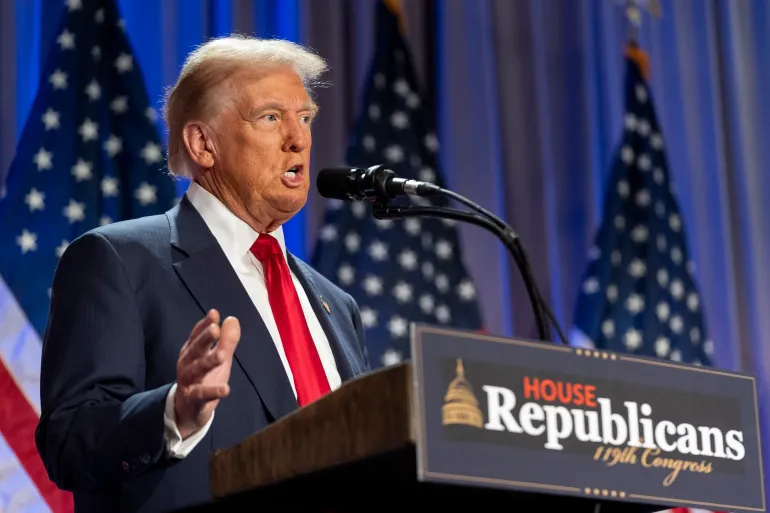US president-elect says measures will remain until countries stamp out irregular border crossings and drug traff
United States President-elect Donald Trump has pledged to slap a 25 percent tariff on all goods from Mexico and Canada and an “additional” 10 percent tariff on Chinese products in response to irregular border crossings and drug trafficking.
Trump said on Monday that he would impose tariffs on Mexican and Canadian imports on day one of his administration and that the measures would remain until the “invasion” of undocumented migrants and drugs came to an end.
Recommended Stories
list of 4 items
Indian billionaire Gautam Adani charged in US for alleged bribery, fraud
Why is the US dollar so strong?
Bitcoin drops below $20,000 over concerns on Fed rate hikes
US doctors urge public to quit vaping as deaths, illnesses rise
end of list
“Both Mexico and Canada have the absolute right and power to easily solve this long simmering problem,” Trump said on his social media platform Truth Social.
“We hereby demand that they use this power, and until such time that they do, it is time for them to pay a very big price!”
Trump said in a subsequent post that he would also impose a 10 percent tariff on China, “above any additional tariffs”, until the country took action to stop fentanyl smuggling.
During his election campaign, Trump pledged to impose tariffs of 60 percent or more on imports of Chinese goods and suggested he could impose a tariff of 1,000 percent or higher on vehicles imported from Mexico.
“Representatives of China told me that they would institute their maximum penalty, that of death, for any drug dealers caught doing this but, unfortunately, they never followed through, and drugs are pouring into our country, mostly through Mexico, at levels never seen before,” Trump said.
Trump’s announcement drew swift responses from Ottawa and Beijing and reverberated throughout international markets, sending the Canadian dollar, Mexican peso, the euro, the British pound, the Korean won and the Australian dollar lower against the US dollar.
Canadian Deputy Prime Minister and Minister of Finance Chrystia Freeland said the two countries had one of the “strongest and closest relationships – particularly when it comes to trade and border security”.
“Canada places the highest priority on border security and the integrity of our shared border. Our relationship today is balanced and mutually beneficial, particularly for American workers,” Freeland said in a statement that did not directly refer to Trump’s tariff threat.
“Today, Canada buys more from the United States than China, Japan, France and the UK combined.”
Freeland added that the US and Canadian authorities worked together “every single day to disrupt the scourge of fentanyl coming from China and other countries” and that Canadian oil was “essential” to the US’s domestic energy supply.
Ontario Premier Doug Ford said the proposed tariffs would be “devastating” to workers and jobs in both countries.
The federal government needs to take the situation at our border seriously. We need a Team Canada approach and response—and we need it now,” Ford said in a post on X.
The Canadian Broadcasting Corporation, Canada’s national broadcaster, meanwhile, described Trump’s announcement as “his most severe threat against Canada in years”.
A spokesperson for China’s Embassy in Washington said that “no one” would win a trade war between the sides.
“About the issue of US tariffs on China, China believes that China-US economic and trade cooperation is mutually beneficial in nature,” spokesperson Liu Pengyu said in a statement.
Trump’s proposals would have potentially enormous ramifications for international trade, though the Republican has made similar threats in the past without following through.
“The tariffs can lead to higher inflation in the US, meaning the Fed will find it harder to cut rates,” Gary Ng, senior economist for Asia Pacific at Natixis in Hong Kong, told Al Jazeera, referring to the US central bank.
“Therefore, the direct implication is that the dollar will remain strong, and global central banks will find it hard to relax policies unless they accept currency depreciation… This is positive for US growth in the short run but bad for the rest of the world.”
If implemented, the president-elect’s proposed tariffs on Mexico and Canada, in particular, would raise questions about the future of the US-Mexico-Canada Agreement (USMCA), a free trade deal signed by Trump that largely maintained the provisions of the pre-existing North American Free Trade Agreement (NAFTA).
“It looks like the Trump tariff changes could end NAFTA by definition as it is a free trade agreement between the USA and Canada and Mexico, respectively,” Tim Harcourt, chief economist at the Institute for Public Policy and Governance at the University of Technology Sydney, told Al Jazeera.
“The president-elect says it’s based on banning the drug fentanyl by halting trade – or providing a disincentive – and immigration but non-fentanyl goods will get caught in the crossfire.”
Trump’s pick for treasury secretary, Scott Bessent, has described tariffs as a “useful tool” for strengthening the president’s hand with other countries.
Numerous economists have warned that Trump’s proposals for broad-based tariffs would raise the cost of everyday items in the US and dampen global growth.
Trump’s supporters have argued that tariffs would encourage the return of manufacturing jobs from overseas and give his administration greater leverage to extract more favourable trade deals from other countries.
China, Mexico and Canada are the US’s three biggest trading partners.
The countries accounted for $830bn of US exports and $1.43 trillion of US imports, respectively, in 2022, according to the Office of the US Trade Representative.


